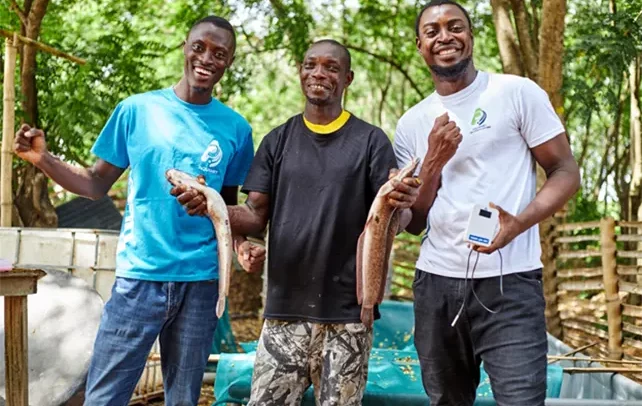Aquament beneficiaries displaying their catch
In Ghana, where fish is a staple in nearly every household, the aquaculture sector plays a critical role in national food security.
Despite producing over 89,000 metric tonnes of fish in 2023, mostly tilapia and catfish, Ghana still imports more than 60% of the fish consumed locally.
Aquamet Technologies, a Ghanaian aquatech startup supported by Kosmos Innovation Center (KIC) is playing a critical role in national food security by supporting smallholder fish farmers grappling with challenges like poor water quality, disease outbreaks, and high feed costs.
On a mission to meet supply chain gaps with cutting-edge but affordable technology designed specifically for the realities of local fish farmers, Aquamet uses a smart water quality probe that monitors essential parameters such as temperature, dissolved oxygen, and pH levels.
Unlike traditional solutions, the device provides real-time alerts via SMS and a mobile app, ensuring farmers, even in remote areas, can respond swiftly to changing water conditions and prevent fish loss.
Since launching, Aquamet has positively impacted over 145 farmers across the Volta, Eastern, Ashanti, and Greater Accra regions. As the country works towards its national goal of producing 200,000 metric tonnes of farmed fish by 2030, Aquamet is emerging as a key player in accelerating this vision and advancing the country’s blue economy.
In addition to the hardware innovations, Aquamet offers a comprehensive farm management app featuring a feeding estimator, robust inventory tools, digital record keeping, and on-demand expert support. These tools enable farmers to reduce feed waste and fish mortality by up to 25%, while increasing productivity and efficiency across their operations.
“With Aquamet, solutions are locally built, farmer-tested, and focused on empowering the next generation of aquaculture entrepreneurs across Africa,” Frank Owusu, co-founder of Aquamet Technologies highlights.
Looking ahead, Aquamet Technologies plans to reach over 100,000 fish farmers across the continent within the next decade, contributing significantly to sustainable food systems and rural livelihoods.
By Samuel Boadi


